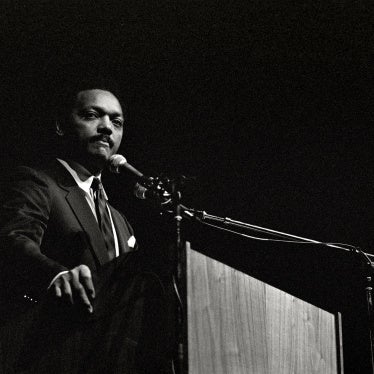October 20, 2008
Governor Sonny Perdue
State of Georgia
203 State Capitol
Atlanta, Georgia 30334
Georgia State Board of Pardons and Paroles
2 Martin Luther King, Jr. Drive, SE
Suite 458, Balcony Level, East Tower
Atlanta, Georgia 30334-4909
Re: Clemency for Troy Anthony Davis
Dear Governor Perdue and Members of the Board:
Human Rights Watch urges you to grant executive clemency to Troy Anthony Davis, who is scheduled to be executed at 7:00 p.m. on October 27, 2008.
As you are aware, Davis was sentenced to death for the 1989 murder of an off-duty police officer, Mark Allen MacPhail. Of the nine eyewitnesses who testified against him at his trial, seven have since recanted and now say they are not sure who shot MacPhail. No physical evidence linked Davis to the crime, and the murder weapon was never found. Three witnesses now say that another man has confessed to the crime.
Even without this new evidence, there would be cause for concern about the reliability of Davis' conviction and the fairness of his sentence. Research shows that black defendants are more likely to receive a death sentence than are white defendants, and those convicted of killing white victims are more often sentenced to death than those who kill blacks. Davis is black; Officer MacPhail was white. Because of the lack of physical evidence, the prosecution's case was based almost entirely on eyewitness testimony, which can be highly unreliable and has been implicated in a number of wrongful convictions.
Human Rights Watch opposes the death penalty in all circumstances because of its inherent cruelty and finality. But supporters and opponents of capital punishment agree that, given the irrevocability of death, every precaution must be taken to ensure that mistakes are not made. There can be no greater failure of a justice system than the execution of an innocent person. As long as there is significant doubt about guilt -- as there is in the Davis case -- the execution must not go forward.
In recent years, it has become clear that innocent persons have been sentenced to death in the United States with alarming frequency. Since 1973, 130 persons -- including five in Georgia -- have been released from death row because of evidence that they were innocent. Some of these men and women had come within hours of execution. In some of these cases, judicial remedies had been exhausted, and it was only executive intervention that prevented the execution of an innocent person.
In March of 2008, the Georgia Supreme Court voted, by a margin of four to three, not to grant Davis a new trial. Chief Justice Sears, joined by Presiding Justice Hunstein and Justice Benham, dissented and urged that Davis be granted an evidentiary hearing on his new evidence, a hearing he has never received.
As the United States Supreme Court has made clear, "clemency is deeply rooted in our Anglo-American tradition of law, and is the historic remedy for preventing miscarriages of justice where judicial process has been exhausted." Herrera v. Collins, 506 U.S. 390, 411-412 (1993). Nowhere is this
"fail-safe" function more critical than in a capital case, where it provides the final opportunity to avoid a terrible and irrevocable wrong. The Davis case -- in which judicial relief was denied by the narrowest of margins, and in which substantial doubts about guilt persist -- is an appropriate case for its exercise.
We urge you to commute the death sentence of Troy Anthony Davis.
Very truly yours,
David C. Fathi
Director, US Program








